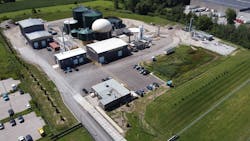Biofuels firm StormFisher adds third anaerobic digester to increase RNG production at Canadian plant
StormFisher has increased its organic waste processing capacity at its London facility in Canada by constructing a third anaerobic digester here.
The plant also has a renewable natural gas (RNG) upgrading system. The London plant is now the biggest food waste anaerobic digestion facility in the country. It can repurpose food waste to provide heat to 2,500 homes in Ontario and sustainable fuel for transport.
Sustainable infrastructure firm Generate Capital owns and operates the London plant in partnership with StormFisher.
“It’s critical to keep building smart, sustainable, circular and affordable waste management infrastructure like this to meet the challenges of the global climate crisis," Bill Caesar, president of Generate’s waste-to-value business, said. "This expands our ongoing commitment to be the leading provider of sustainable solutions for organic waste in North America.”
The construction of the third anaerobic digester began in 2020, increasing food waste intake capacity by 30%. It was constructed by engineered storage systems firm Greatario.
"Our in-house team of expert engineers, maintenance technicians and operators allows StormFisher to provide the best service to both our feedstock providers and energy customers,” added Pearce Fallis, vice president of operations at StormFisher. “This new digester is part of our commitment to bringing innovative solutions for organic waste to market, and an exciting part of our growth in capabilities across waste collection, anaerobic digestion, biogas production, and RNG upgrading.”
Additionally, the renewable natural gas upgrading system provides energy for heat and transportation from renewable, sustainable sources.
The London facility enables municipalities and businesses to divert waste from landfills as per the Ontario Food and Organic Waste Policy. The policy requires municipalities to implement green bin programs and set a framework to divert food waste from the industrial, commercial and institutional sector.
About the Author
EnergyTech Staff
Rod Walton is head of content for EnergyTech.com. He has spent 17 years covering the energy industry as a newspaper and trade journalist.
Walton formerly was energy writer and business editor at the Tulsa World. Later, he spent six years covering the electricity power sector for Pennwell and Clarion Events. He joined Endeavor and EnergyTech in November 2021.
He can be reached at [email protected].
EnergyTech is focused on the mission critical and large-scale energy users and their sustainability and resiliency goals. These include the commercial and industrial sectors, as well as the military, universities, data centers and microgrids.
Many large-scale energy users such as Fortune 500 companies, and mission-critical users such as military bases, universities, healthcare facilities, public safety and data centers, shifting their energy priorities to reach net-zero carbon goals within the coming decades. These include plans for renewable energy power purchase agreements, but also on-site resiliency projects such as microgrids, combined heat and power, rooftop solar, energy storage, digitalization and building efficiency upgrades.
